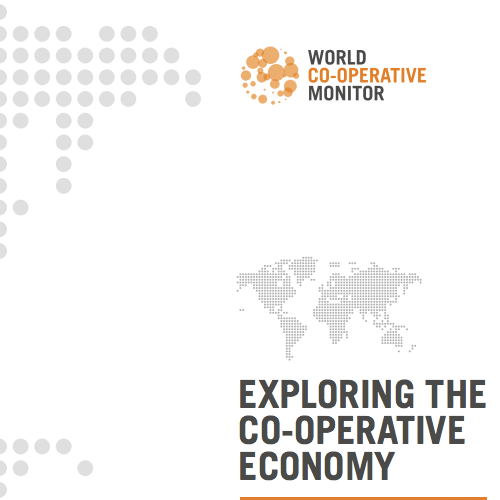BLOG
‘Our priority is to “educate” the authorities as to the potential of co-operatives in the health sector’

Interview with Vanessa Hammond, chair of the Health Care Co-operatives Federation of Canada and member of the Board of the International Health Co-operative Organisation
What are the origins of the Healthcare Co-operatives Federation of Canada and what is its activities and future projects?
For many decades, the only formal Canadian group of health co-operatives was in Saskatchewan, a province in which government was supportive of community ownership. Across the rest of Canada we gradually became aware, primarily through personal connections within the overall co-op movement, of other co-ops working for the wellness of individuals and groups in their communities. In 2010, the Canadian Co-operative Association (now Co-ops and Mutuals Canada) and The Co-operators (our leading insurance co-op) offered to promote a meeting in Regina of representatives of health, wellness and social service co-ops from across Canada. At this first meeting we learned about the widely varying work of our colleagues across the country.
The wide range of work of the co-ops represented at that first meeting did much to define the scope of our membership. As this 100% volunteer organisation evolved, our main wish was to be in contact with each other and to continue learning of each others’ best practices and best programs. This Learning Exchange has been an important aspect of every HCCFC meeting.
Our other priority has been educating governments (federal, provincial and local) about the work and potential of health co-ops. This is innately challenging.
Also we need to educate health (and medical) leaders at community level across the country. This should include introducing the concept of health co-operatives to medical and medical administration students at community colleges and universities.
Lack of funding for staff remains a major challenge. Subject to decisions at our October AGM, we will continue to focus on networking and the Learning Exchange internally, and on raising awareness at all levels of government and in educational institutions.
What is the level of implementation of health co-operatives in Canada?
We believe there are approximately 120 health co-ops across Canada serving 1 in 35 Canadians. This may be an underestimate because statistical data on the co-op sector was not collected by government for many years.
How does the collaboration between the public health system and health cooperatives in Canada work?
The Canada Health Act guarantees affordable, accessible, appropriate health care for all Canadians. In most provinces any group can form a co-op and deliver whatever services its members have the desire and capacity to organise. In some there are restrictions on who may own a medical delivery organisation. Oversight of medical standards is controlled by the provincial departments of health.
Medical services for all in some provinces, and for only the most vulnerable in others, are generally provided through staff salaried by the regional health (medical) authorities of the provincial governments. In many situations, medical staff invoice the regional authorities for the specific services they provide, and then pay a percentage (or flat fee) to the owners of the organisation in which they work. In other words, they are independent contractors who pay the co-op, or other host organisation, for the use of facilities and services. There is no consistency across the Canada!
Do you believe that health co-operatives provide a genuine alternative of the development of national health systems? And if you do, why?
I believe that health co-operatives are an outstanding option through which communities can articulate, advocate for, establish and support the full range of health, well-being and medical services. In countries in which there is no “universal” medical care, they are being used effectively to build systems that focus initially on the social determinants of health, providing the basics of clean water, nutritious food, safe housing and work conditions, thereby doing much to prevent illness and accidents.
Health services are much less costly than medical services and health co-operatives and our focus on health and well-being have the potential to reduce costs and to shorten waiting lists for medical services.
You are a member of the Board of the International Health Co-operative Organisation – what do you think are the challenges of the international co-operative movement in the health sector?
We feel there is a lack of resources to bring together health, well-being and medical co-ops from around the world, or even from each continent, for a length of time sufficient for meaningful learning exchanges.
We caution against assuming that the “teachers” would be the more established or larger co-ops from the wealthier countries or that they would be those focusing on medical treatment of the results of illness and accident rather than encouraging health and well-being practices to reduce the need for medical intervention.
We recognise that staff, volunteers and contractors involved with health, wellness and social service co-ops are stretched to breaking point and trying to focus on international needs can be almost impossible.
The Blueprint for a Co-operative Decade, launched by International Co-operative Alliance, aims that co-operatives become the preferred business model in 2020? What initiatives are the Canadian co-operatives developing in relation this aspect of the Blueprint?
Speaking only for the Health, Wellness and Social Services (including medical) sector, we are working hard to identify the health and economic benefits of the co-op approach to health, to educate government at all levels about the current work of our sector, and to support the development and growth of co-ops in our sector. Our aim is for the co-op approach to health, wellness and social services to be seen as an option that is as valid as any other approach, and no longer to be described as “alternative.”



